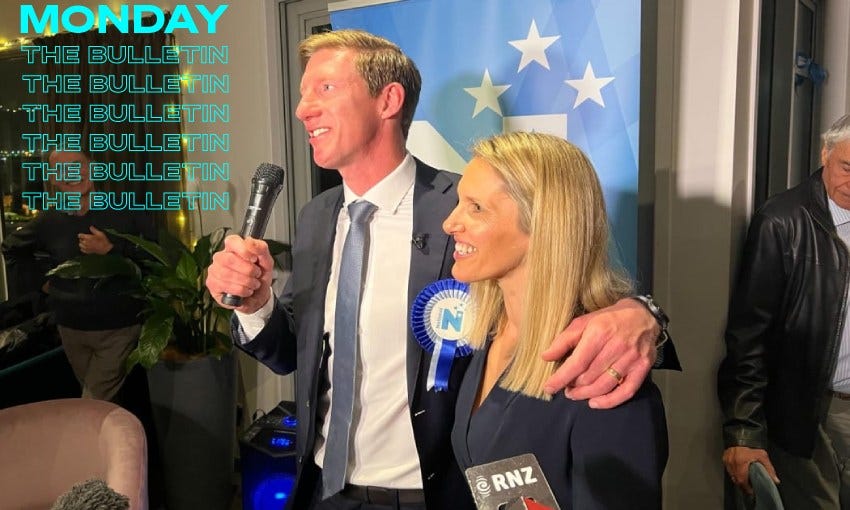Does the byelection result hold clues for next year?
The result was expected but the anti-mandate movement tested its political potential while some say Labour failed to show up for the provinces.
Mōrena and welcome to The Bulletin for Monday, June 20, by Anna Rawhiti-Connell. Presented in partnership with Z Energy.
In today’s edition: debate over health worker shortages; DHB member says MIQ an “imposition”; swimming restricts transgender athlete participation; but first, a look at the Tauranga byelection.
Sam and Julia Uffindell after the win on Saturday night (Photo: RNZ / Giles Dexter)
Tauranga’s new MP lines up behind party priorities
National’s Sam Uffindell won the Tauranga byelection easily over the weekend with Labour’s Jan Tinetti trailing him by 6000 votes. In step with his party and voter concerns, Uffindell says his focus is on crime, transport and the cost of living, with plans to introduce a private members’ bill that would fine gang members riding in convoys. Uffindell said the Bay of Plenty has the highest number of gang members in the country and is quoting numbers from the National Gang List (NGL). It’s probably the closest approximation to a count of people in gangs we have but police have cautioned against using it in the past, saying the NGL is an intelligence gathering exercise and not an accurate statistical picture of gang membership or activity.
A provincial bellwether?
The Herald’s political editor Claire Trevett (paywalled) thinks the prime minister missed a trick by not making an appearance in Tauranga before the byelection. The PM was due to visit last week but was sick. Leaving Tinetti to fight alone “sent an appalling message to the people of Tauranga – and by extension the people of other provinces,” says Trevett. Labour took provincial seats previously regarded as safe National seats in the 2020 election. The PM made an appearance in Northcote during the 2018 byelection campaign. The race for that seat was considered to be tighter, with Shannan Halbert eventually losing to National’s Dan Bidois by 1,310 votes. Halbert went on to win the seat by 2,534 votes at the 2020 election. Writing for Stuff, Josie Pagani thought both Labour and National were lacklustre in their campaigning efforts.
A not insignificant showing for Sue Grey
A Newshub Nation-Reid research poll last week found a fifth of voters in Tauranga would consider supporting an anti-mandate party. That hasn't come to fruition but Sue Grey of the New Zealand Outdoors & Freedom party picking up 4.8% at the byelection is noteworthy. In the Northland and Northcote byelections, candidates from parties outside parliament didn’t get more than 1.5% of the vote. Grey moved to Tauranga for the byelection so this was undoubtedly a test of the movement’s election potential.
Tamaki’s coalition upbeat
As Toby Manhire reports, Brian Tamaki’s Freedom and Rights coalition was buoyant on Saturday night, toting up the votes of Grey and two other candidates united by an anti-mandate, anti-vaxx stance, suggesting they could be in parliament next year. Manhire writes “the Billy-TK-Jami-Lee-Ross experiment of 2017 is still fresh as a cautionary tale of fringe parties forming expedient political marriages. But doubt not that they’ll be giving it a crack.” Tamaki is currently doing a round of talks throughout the country proposing that “revolution is the solution”.
Tomorrow morning The Spinoff launches a new weekly business newsletter. Stocktake is produced in partnership with Kiwibank and will feature the people behind the businesses driving Aotearoa and insight on how the forces affecting the economy of Aotearoa will impact the lives of New Zealanders. Sign up to Stocktake to get the first edition delivered to your inbox tomorrow morning – and go in the draw to win one of three prize packs from one of our favourite business success stories, Fix and Fogg. Two subscribers will receive a six-month supply and one lucky winner a full year’s supply of Fix and Fogg’s delicious nut butters.
Debate over ways to address health worker shortages
In response to Auckland’s medical school saying the government won’t let them open up more places to train doctors, health minister Andrew Little says it isn’t that simple. Little says the bottleneck hasn’t been med school spots but the capacity of DHBs to support the training of graduates in hospitals. Modelling suggests we need 50 new doctors a year to meet shortfalls. National’s immigration spokesperson Erica Stanford called out immigration minister Kris Faafoi on Q&A yesterday, saying she thought he’d misunderstood the issue with nurses and the two-year wait requirement for residency. Stanford said National would use section 49 of the Immigration Act to apply conditions to their visas rather than use the two-tier system recently introduced with the green list.
Government imposed MIQ facilities on Rotorua
District Health Boards (DHBs) around the country are holding their last meetings ahead of being disestablished on July 1. As reported by Felix Desmarais, Lakes District DHB board member Merepeka Raukawa-Tait used her last meeting to relay her feelings about the burden managed isolation and quarantine (MIQ) facilities had placed on the DHB. She said it was “unfair”, “an edict” and that the government failed to “realise that we still have to try and do everything else in the community”. DHB chief executive Nick Saville-Wood said MIQ had diverted significant DHB resources into staffing three sites in Rotorua. Use of MIQs is winding down. As Newsroom’s Matthew Scott reported last week, the three remaining facilities are set to close in two weeks and will return to being hotels.
A message from senior writer Alex Casey:
Earlier in the year we published When the Lessons End, an in-depth examination of one woman’s experience at the hands of her private music teacher, and the impact it had on the rest of her life. Stories like these take months of rigorous reporting, travel costs and hefty legal fees to get to publication stage, all of which was only possible thanks to our members.
I feel so lucky to work for an organisation that encourages long-form investigative journalism, but the reality is that this work is impossible without the ongoing support of our readers. If you can, please support our work by donating today.
Old man’s beard must go!
In 1989 the Department of Conservation ran an absolute ear worm of an ad featuring David Bellamy, an older man with a beard, saying “Old man’s beard must go” as he urged people to keep an eye out for the invasive weed. Old man’s beard has not gone but as Stuff’s Will Harvie reports, scientists are now hopeful the release of two biocontrols might help control it. Biocontrols are natural creatures that kill or disrupt other living things like weeds. In this case, the sawfly and the eriophyid mite are showing signs of establishing populations on old man’s beard at a site near Amberley. Manaaki Whenua-Landcare Research’s Arnaud Cartier says the biocontrols won’t eradicate old man’s beard, but they could restore “balance between the weed and its natural enemies”.
Got some feedback about The Bulletin, or anything in the news? Get in touch with me at thebulletin@thespinoff.co.nz
Jacob Flanagan explains why everyone’s so mad with BusinessNZ over the new fair pay law; Charlotte Muru-Lanning finds out how hospo is feeling as the world reopens; Himali McInnes looks back at a stressful, expensive, sometimes wonderful year renovating her 100-year-old home; Sam Brooks discovers what went into the creation of Nude Tuesday’s gibberish language; and Chris Schulz talks to Stuff ’s blogging stars of the 2010s.
Swimming to restrict participation of transgender athletes
FINA, the global governing body for swimming, has voted to restrict the participation of transgender athletes in elite women's competitions and will create a new “open” category at competitions for swimmers whose gender identity is different than their birth sex. The new policy requires transgender competitors to have completed their transition by the age of 12 to be able to compete in women's competitions. FINA commissioned a report from experts in the fields of sport, law and medicine. Panel member Dr Adrian Jjuuko said the policy is “only the first step towards full inclusion and support for the participation of transgender and gender-diverse athletes in aquatic sports, and there is a lot more to be done." Athlete Ally, an LGBTQ advocacy group, called the new policy "discriminatory, harmful, unscientific and not in line with the 2021 IOC principles".
One of New Zealand’s worst miscarriages of justice.
“I was going to stand up and say, ‘you little beauty’,” Hall joked about the court’s decision, his eyes glinting above the line of his facemask.
For a feature today, I recommend Mike White’s thorough and compassionate account of Alan Hall’s fight for justice and journey to the Supreme Court where his murder conviciton was recently overturned.












National could have stood anyone in this electorate and they would have got in. Hardly a bellwether electorate. We only have to read the reports of what people think is acceptable bigotry in council meetings, on the street and in shops, to predict the political leanings of this electorate. I tell you what, instead of lowering the voting age, why don't we have a limit to how old you can be to vote. 65 sounds great. That way, representation would reflect the desires of those that policy will effect.